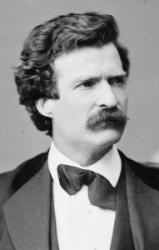The writing style of
Mark Twain
Mark Twain
1835-1910
American writer and humorist, known for his novels 'The Adventures of Tom Sawyer' and 'Adventures of Huckleberry Finn'.
Mark Twain, the pen name of Samuel Langhorne Clemens, is celebrated not only for his keen wit and deep insight into the human condition, but also for his distinctive writing style, which has captivated readers and influenced writers for over a century. Twain’s style is immediately recognizable for its blend of humor, narrative prowess, and unpretentious language, making his works accessible yet profoundly meaningful.
Twain’s approach to sentence structure often reflects the rhythms of natural speech, giving his prose a conversational quality that draws readers in. He frequently employs short, punchy sentences that mirror the spoken word, a technique that enhances the immediacy and impact of his narratives. This is interspersed with longer, more complex constructions that add depth and detail, showcasing his skill as a storyteller.
One of the most distinctive aspects of Twain’s writing is his adept use of dialects and regional vernaculars. This not only adds authenticity to his characters and settings but also enriches the cultural texture of his stories. By capturing the unique voices of various American locales, Twain celebrates the diversity of the nation while also critiquing its social and moral shortcomings.
Twain’s choice of words often serves a dual purpose: to entertain and to provoke thought. His vocabulary is robust yet straightforward, avoiding unnecessary complexity to ensure clarity and enhance relatability. His adept use of irony and satire is particularly effective, allowing him to address serious social issues with a light touch that can both amuse and enlighten his audience.
In terms of narrative structure, Twain shows a preference for a loosely connected series of episodes rather than a tightly organized plot. This episodic structure allows him to explore a wide range of scenarios and characters, reflecting the unpredictable twists and turns of real life. The fluidity of his storytelling mirrors the meandering journey of his protagonists, particularly evident in works like “Adventures of Huckleberry Finn.”
Through these stylistic choices, Twain not only entertains but also challenges his readers to reflect on the moral complexities of society. His writing remains a pivotal element of American literature, demonstrating the power of prose to influence thought and inspire change.
